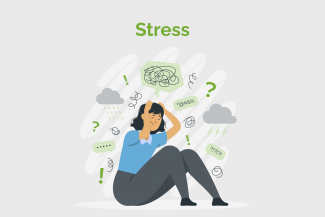Stress is what happens when you have too much to handle. The body goes into fight or flight mode. Your heart rate may go up and you may breathe faster or sweat more. This response is fine within normal limits. But beyond that, it can be harmful.
Stress is a global issue and increases with Age.

Your doctor may suggest some of the following self-help strategies:
- Self-understanding: Know what is causing you stress
- Self-management: Be more organised, control your thoughts
- Self-talk: Stand in front of a mirror and counsel yourself
- Conflict resolution: Make ways to resolve smaller conflicts that may snowball into bigger ones.
- Positive attitude: See the upside of the situation
- Breathing exercises: Do pranayama
- Try meditation
- Exercise
- Alter your diet: Add vegetables and fruits (lot of fibres) to your diet
- Time management: Prioritise your actions so you are not swamped with work. Always leave time to some things you enjoy. Make a “to do” list
- Get enough sleep: 8 hours minimum
- Avoid recreational drugs, substance abuse, all nicotine products like cigarettes, cigars, hookah, etc.
- Reduce alcohol, caffeine and sugars
Diet: Eating healthily helps the body cope better with stress. Include the following in your diet:
- Oatmeal, nuts and low fat milk help counter stress by lowering blood pressure
- Foods that increase serotonin levels, like carbs, wholegrain breads and pastas
- Oranges, black tea, fatty fish strengthen the immune system and reduce stress
- Spinach, soyabean, salmon are rich in magnesium, which lower the effects of stress.
Exercise: Exercise is enormously helpful in reducing stress. It fills you up with feel-good endorphins, takes your mind off worries and helps you sleep better. Take up any of the following:
- Aerobic exercises
- Swimming
- Yoga
- Gym
- Cycling
- Walking for 30 mins three times a week
- Any activity that raises your heart rate is good.
Take charge - Your action plan
- Eat healthy
- Manage your time – don’t pack your day with endless activities
- Get self-assessed – with the help of a questionnaire or by assessing and analysing situations that make them feel more stressed – and coming up with solutions
- Exercise
Support team
- General physician
- Psychologist
- Hypnotist
- Behaviour therapist
- Nutritionist
- Fitness expert
Changed
06/Jan/2017
Condition









